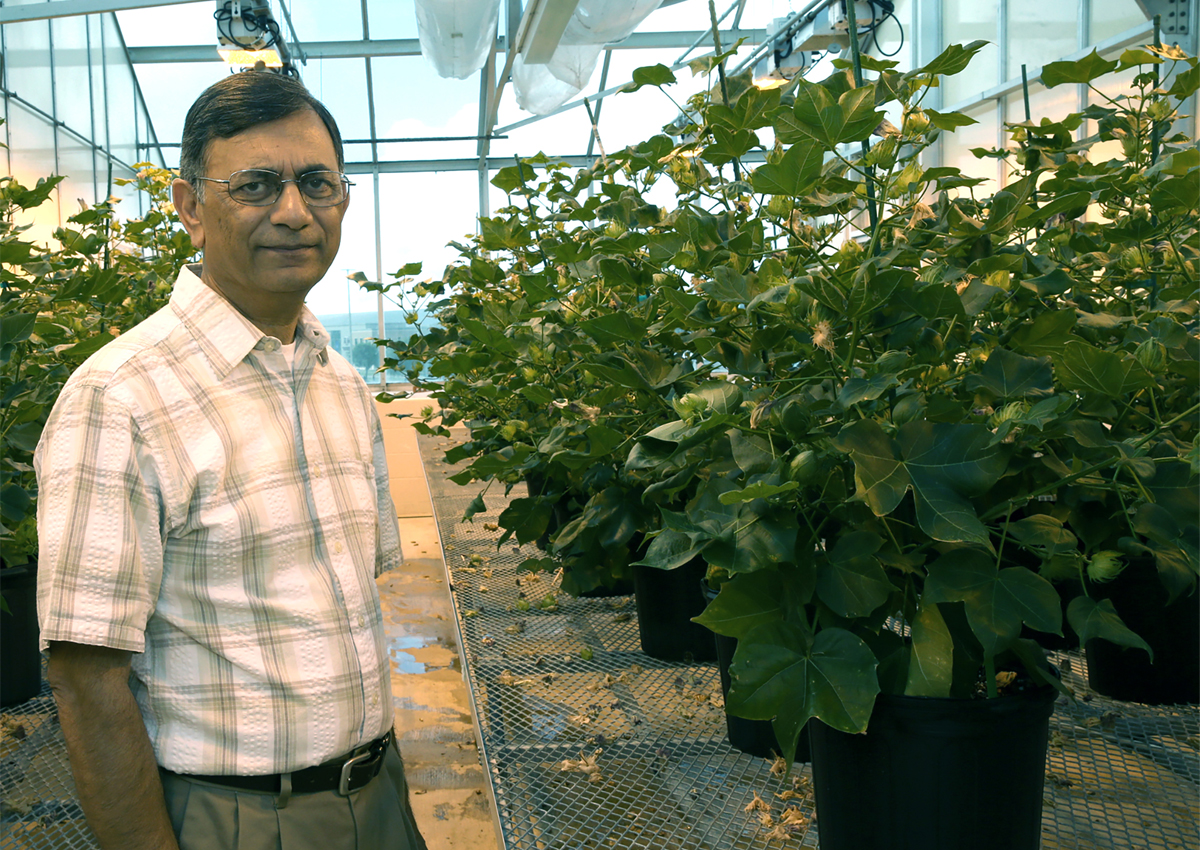
FDA Approves Texas A&M's Ultra-Low Gossypol Cotton for Human and Animal Consumption
October 16, 2019| |
The U.S. Food and Drug Administration (FDA) has approved an ultra-low gossypol cottonseed, ULGCS, to be utilized as human food and animal feed. ULGCS is derived from a transgenic cotton variety TAM66274 developed by plant biotechnologist Keerti Rathore and his team at Texas A&M AgriLife Research. TAM66274 is a unique cotton plant with ultra-low gossypol levels in the seed, which makes the protein from the seeds safe for food use, but also maintains normal plant-protecting gossypol levels in the rest of the plant, making it ideal for the traditional cotton farmer.
ULGCS has the potential to make a significant impact on food security especially in poor, cotton-growing countries, according to Rathore. "The amount of protein locked up in the annual output of cottonseed worldwide is about 10.8 trillion grams," he said. "That is more than what is present in all the chicken eggs produced globally, and enough to meet the basic protein requirements of over 500 million people."
The FDA approval for ULGCS is only the fifth for a university-developed, genetically engineered crop in the 25-year history of genetically modified products in the U.S., and is the first for a Texas university. According to Rathore, the human food ingredients from TAM66274 cottonseed can be roasted cottonseed kernels, raw cottonseed kernels, cottonseed kernels, partially defatted cottonseed flour, defatted cottonseed flour and cottonseed oil. For animal feed, the low-gossypol cottonseed can be used in the aquaculture and poultry industries.
To get to this point, Rathore and his team sought approval from two government agencies. First, a non-regulated status for TAM66274 was secured from the U.S. Department of Agriculture's Animal and Plant Health Inspection Service. Then, they pursued the FDA approval. "This approval from FDA enables cultivation and use of this promising new cottonseed product within the U.S.," Rathore said.
For more details, read the article in AgriLife Today.
| |
You might also like:
- USDA Approves GE Low-Gossypol Cotton
- Cotton Event TAM66274 in ISAAA GM Approval Database
- GM Cotton Events in ISAAA GM Approval Database
Biotech Updates is a weekly newsletter of ISAAA, a not-for-profit organization. It is distributed for free to over 22,000 subscribers worldwide to inform them about the key developments in biosciences, especially in biotechnology. Your support will help us in our mission to feed the world with knowledge. You can help by donating as little as $10.
-
See more articles:
-
News from Around the World
- 14% of Global Food Goes to Waste, FAO Reports
- Study Reveals the Resilience of Rice to Floods
- Hornless Cattle Now Possible Thanks to Genome-editing
- FDA Approves Texas A&M's Ultra-Low Gossypol Cotton for Human and Animal Consumption
- Genomics-Assisted Breeding Delivers Two Improved Chickpea Varieties in Record Time
- Family of Crop Viruses Shown at High Resolution for the First Time
-
Research Highlights
- Plant Protein that Triggers Photoprotection Identified
- Genetically Engineered Plants Occur in Large Scale Naturally
-
Plant
- NAL8 Contributes to Leaf and Spikelet Development in Rice
- Large-scale Genomics for Wheat Improvement
-
Read the latest: - Biotech Updates (December 17, 2025)
- Gene Editing Supplement (December 17, 2025)
- Gene Drive Supplement (February 22, 2023)
-
Subscribe to BU: - Share
- Tweet

